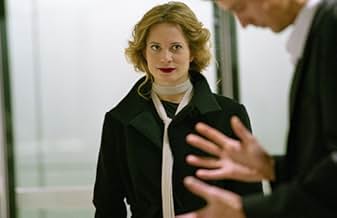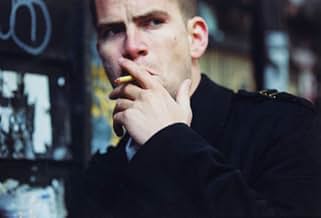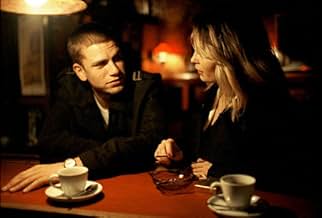Reconstruction
- 2003
- Tous publics
- 1h 32min
NOTE IMDb
7,3/10
7,7 k
MA NOTE
Ajouter une intrigue dans votre langueA young man who thought himself already in love with a nice girl is drawn into a literary drama when he is captured by a deep and stimulating love affair.A young man who thought himself already in love with a nice girl is drawn into a literary drama when he is captured by a deep and stimulating love affair.A young man who thought himself already in love with a nice girl is drawn into a literary drama when he is captured by a deep and stimulating love affair.
- Réalisation
- Scénario
- Casting principal
- Récompenses
- 12 victoires et 11 nominations au total
Carlos Claro Schelin
- Mercedes Sand
- (as Mercedes Claro Schelin)
Line Søndergaard Poulsen
- Girl in metro station
- (non crédité)
Avis à la une
"Reconstruction" is a clever, European take on "Unfaithful" where an older husband uses literary intellect instead of violence to attempt "The Revenge of the Cuckold."
But we have no idea how much is real or imagined or roman a clef or the character of the author is identifying too much with his alter ego, as we are told from the outset that what we will be seeing is the magic of the storyteller or puppeteer, watching as he manipulates his characters, trying out different situations in different drafts of a novel, erasing and playing out different scenarios of chance and choice, where art replaces the memory science of "Code 46."
I don't think I was the only audience member, however, who was rooting instead for the tall, dark, handsome young man as Nikolaj Lie Kaas has captivating chemistry with Maria Bonnevie (and I feel really foolish that I couldn't tell from either the film or the Danish credits until I looked at the IMDb listing that she plays both the jilted girlfriend and the adulterous wife).
The author makes some lame justifications about women needing love and men accidentally falling into it, or some such, that doesn't quite make sense and the film is supposed to be illustrating the point that a man has to learn about hurt as a price to be able to love. The author's self-understanding I suppose is illustrated by him reading his book's dedication to his wife in a desperate plea for her to forgive him all his inattention, etc. as he needs her for his art, so she shouldn't look for passion elsewhere.
But we're left more with the very powerful visuals of the different versions of how he imagined her possible affair could have started (a la "Brief Encounter") and its ramifications or concluded, and the feeling that the older guy was a smug deus ex machina.
In the things one can learn from the movies department: we also get a nice tour of Copenhagen-- people can smoke anywhere, even on the subway, and do, constantly; restaurant bathrooms have real terry cloth towels; the Hilton is really luxurious; Danes and Swedes don't seem to exchange cell hone numbers; and, like in "Italian for Beginners," Danes seem to think of Italy as the place to go for romance.
But we have no idea how much is real or imagined or roman a clef or the character of the author is identifying too much with his alter ego, as we are told from the outset that what we will be seeing is the magic of the storyteller or puppeteer, watching as he manipulates his characters, trying out different situations in different drafts of a novel, erasing and playing out different scenarios of chance and choice, where art replaces the memory science of "Code 46."
I don't think I was the only audience member, however, who was rooting instead for the tall, dark, handsome young man as Nikolaj Lie Kaas has captivating chemistry with Maria Bonnevie (and I feel really foolish that I couldn't tell from either the film or the Danish credits until I looked at the IMDb listing that she plays both the jilted girlfriend and the adulterous wife).
The author makes some lame justifications about women needing love and men accidentally falling into it, or some such, that doesn't quite make sense and the film is supposed to be illustrating the point that a man has to learn about hurt as a price to be able to love. The author's self-understanding I suppose is illustrated by him reading his book's dedication to his wife in a desperate plea for her to forgive him all his inattention, etc. as he needs her for his art, so she shouldn't look for passion elsewhere.
But we're left more with the very powerful visuals of the different versions of how he imagined her possible affair could have started (a la "Brief Encounter") and its ramifications or concluded, and the feeling that the older guy was a smug deus ex machina.
In the things one can learn from the movies department: we also get a nice tour of Copenhagen-- people can smoke anywhere, even on the subway, and do, constantly; restaurant bathrooms have real terry cloth towels; the Hilton is really luxurious; Danes and Swedes don't seem to exchange cell hone numbers; and, like in "Italian for Beginners," Danes seem to think of Italy as the place to go for romance.
8pbn
"Reconstruction" is overt about its style from the first minute when a deep-voiced narrator cautiously introduces the audience to the story and the narrative form. From then on, and until the narrator returns at the very end, we are cast into a complex and difficult drama set in a big city environment filmed in stunning craft and style. Copenhagen has rarely been seen as interesting, and in an odd sense charming, as here.
This is not an expensive film - the Director's Cut entity behind the film was designed specifically to produce good films on even lower budgets than are the norm in Denmark - but its appearance is delightful and intriguing with its sometimes bright, sometimes dark and often grainy cinematography, additional effects of occasional written identifications of characters and locations, and classic-style title design.
The story sees a young man captured by the meeting with a woman different than, but resembling his usual girlfriend, and struck by existential doubt when he finds himself a stranger to those he thought he knew. The plot is impossible to grasp completely, at least at first sight, but sufficiently immediate for the beholder to like it and be taken in by it. To me, the lack of answers is a bit over the top and causes me to cut my IMDb rating for the film to 8, but with the strong support for David Lynch films and other similar works in recent years I am probably in the minority on that point.
Danish Nikolaj Lie Kaas and Swedish-Norwegian Maria Bonnevie are both extraordinary, Kaas in the antagonist role of Alex and Bonnevie in a rare double part as the different, but similar Aimee and Simone. A repeated scene in a bar in which Aimee and Alex meet is a particularly fine example of the precise and strong performances. The fine Danish actors Nicolas Bro and Malene Schwartz are the most noteworthy of the additional cast.
Ambition is Christoffer Boe's middle name, but he lives up to any and all expectations Danish experts may have had to him since he graduated from the National Danish Film School in 2001. He has already been compared to another renewer of Danish film, Lars von Trier, and while I am reluctant to compare this first-time feature director to an established international star, I do think "Reconstruction" bears a stronger sense of place through its use of locations and the plot's connection to them, a superior depiction of relationships between people, and sometimes simply a more profound joy of storytelling than in any of Trier's work.
This is not an expensive film - the Director's Cut entity behind the film was designed specifically to produce good films on even lower budgets than are the norm in Denmark - but its appearance is delightful and intriguing with its sometimes bright, sometimes dark and often grainy cinematography, additional effects of occasional written identifications of characters and locations, and classic-style title design.
The story sees a young man captured by the meeting with a woman different than, but resembling his usual girlfriend, and struck by existential doubt when he finds himself a stranger to those he thought he knew. The plot is impossible to grasp completely, at least at first sight, but sufficiently immediate for the beholder to like it and be taken in by it. To me, the lack of answers is a bit over the top and causes me to cut my IMDb rating for the film to 8, but with the strong support for David Lynch films and other similar works in recent years I am probably in the minority on that point.
Danish Nikolaj Lie Kaas and Swedish-Norwegian Maria Bonnevie are both extraordinary, Kaas in the antagonist role of Alex and Bonnevie in a rare double part as the different, but similar Aimee and Simone. A repeated scene in a bar in which Aimee and Alex meet is a particularly fine example of the precise and strong performances. The fine Danish actors Nicolas Bro and Malene Schwartz are the most noteworthy of the additional cast.
Ambition is Christoffer Boe's middle name, but he lives up to any and all expectations Danish experts may have had to him since he graduated from the National Danish Film School in 2001. He has already been compared to another renewer of Danish film, Lars von Trier, and while I am reluctant to compare this first-time feature director to an established international star, I do think "Reconstruction" bears a stronger sense of place through its use of locations and the plot's connection to them, a superior depiction of relationships between people, and sometimes simply a more profound joy of storytelling than in any of Trier's work.
"Reconstruction" was an excellent movie. Some have renounced it for its little tricks. Shame on them. While the little tricks themselves weren't impressive, they contributed to the film's ideas. Maria Bonnevie was enchanting. Interestingly, when I left the theater, I felt as though I knew (and perhaps loved) Aimee even though she was a construction, a fiction about whom next to nothing was revealed. In this manner, Alex and I bonded although there is no Alex. This movie was something that viewers can feel. I loved the skepticism. I enjoyed belong dazzled by the beauty only to have it taken away. Was it ever there? There is an honesty in "Reconstruction" that is rare in cinema. This movie wasn't especially subtle in its nihilism, which was fine. Anything more subtle would have been wasted on many, maybe even me. Who knows?
It took me quite a long time to figure out what I thought about this movie, and it seems that I have come to the conclusion that this movie is more about the experience of watching it. The plot is very abstract and I find it very hard to believe that anyone completely "got" the film. However while watching the film this doesn't seem to matter, you're enthralled. In the end i was left with a lot of questions and it led to some interesting discussions, but what really struck me and stayed with me was the beautiful imagery, the sights sounds and mood of the movie. In this sense the film is almost haunting. Anyway I would have to recommend and perhaps a second viewing would clear things up for me. As a sidenote the acting all around was superb and the two lead actors were enchanting.
First things first: I find pointless to summarize the plot, therefore I'll stick to my own thoughts about it.
Grainy fade-outs, near-flawless performances, mind-gripping in its non-linear simplicity plot, endless possibilities (if you are prone to indulging in analysis) and a precise, clean-cut overall aspect- are all there, in Boe's beautiful, if slightly formal, first long feature.
This film dodges, quite effortlessly, the one major shortcoming (if you ask me)of Last Year In Marienbad, to which it has been compared; unlike the former, Reconstruction manages, through unmistakably warm-bloodied and wrapped in smoke actors'performances, to surpass the cartoonish, slightly de-humanized concept that pervades Resnais's (i dare utter the word) masterpiece. In other words, the characters are a significant little more than archetypes, they are individuals. Subsequently, the three A's (Alex, Aimee-stunning Marie Bonnevie- and August) stir vaguely-rooted emotions in the spectator, aided by the 3-dimensionality of their acting and enhanced by innumerable, purposeful close-ups and near-perfectly-fitted music.
The intelligent rather than inventive script receives "thumbs up" not for itself but for its glossy, yet not sultry, rendition by often unbearably beautiful shots. Also, the demure approach to sexuality speaks volumes about the power of the camera&actors unity to suggest powerful feelings.
The coherent-enough story (don't let yourselves taken in by deceptive ambiguity) escapes down-and-out moronic de-constructivism for its own sake, allowing thus the average movie-goer to suck the film in, irrespective of his cultural background.
Although data about the characters arrives in dribs and drabs, the film is carefully plotted and succeeds in keeping the spectator's interest up till the end. August, in spite of apparent filmic omnipotence, is bare-handed against the efficiency of tender, scintillating and dizzying love story; the real puppeteer is the director, through his double, the cigarette-levitating, literal charmer, who pulls the strings in this bittersweet faerie. So, once you've learned the ropes of his editing choices and non-linear story ( the 3 possibilities/photos the woman has and other details), which require at least one viewing, Reconstruction becomes more than a feast for the eye. It allows a sensitive insight into a terribly fragile dreamlike world: Orpheus is supposed never to doubt the flesh-and-bone unseen certainty of being followed by Euridice on their way out of the Inferno. The visually enticing, effective portraying of Alex and Aimee's every movement offers precious glimpses of their innermost thoughts.
Speaking flaws, a restraint from taking risks in points of frame composition (aka predictable angles, never going off the beaten track) is quite obvious BUT it actually seems reassuring. Also, the absence of a clear message might affect the appreciation of a part of the public, BUT this is small concern for the director, whose primary aim (stated in August's voice off, in the beginning) is not to convey a moral attitude or a manifesto, but to ease pure delight on the spectators. Nevertheless, the I-cannot-relate-to-it factor breeds suspicion as to the actual relevance of what we see = Why should I care? Meaning, this seemingly inconsequential display of beautiful shots and silences can't extend its influence beyond the immediacy of the 90min viewing. BUT this is highly-debatable, if you take into account different responses from different people.
What I've just said about Reconstruction is hopefully not a gratuitous eulogy, but a considerate comment on what seemed to me a remarkably 'polished' if visually engrossing experience. Throughout the film, one gets the impression of intruding, of being a nosy Parker in an almost perfect, smoothly-trimmed, classy-as-heaven human landscape. Not an emotionless cine-verite, not a sweeping melodrama, not a frowningly guru-ish food-for-thought crap, Reconstitution proves warm enough to be cherished, praiseworthy in terms of cinematography, an outstanding and promising debut.
Grainy fade-outs, near-flawless performances, mind-gripping in its non-linear simplicity plot, endless possibilities (if you are prone to indulging in analysis) and a precise, clean-cut overall aspect- are all there, in Boe's beautiful, if slightly formal, first long feature.
This film dodges, quite effortlessly, the one major shortcoming (if you ask me)of Last Year In Marienbad, to which it has been compared; unlike the former, Reconstruction manages, through unmistakably warm-bloodied and wrapped in smoke actors'performances, to surpass the cartoonish, slightly de-humanized concept that pervades Resnais's (i dare utter the word) masterpiece. In other words, the characters are a significant little more than archetypes, they are individuals. Subsequently, the three A's (Alex, Aimee-stunning Marie Bonnevie- and August) stir vaguely-rooted emotions in the spectator, aided by the 3-dimensionality of their acting and enhanced by innumerable, purposeful close-ups and near-perfectly-fitted music.
The intelligent rather than inventive script receives "thumbs up" not for itself but for its glossy, yet not sultry, rendition by often unbearably beautiful shots. Also, the demure approach to sexuality speaks volumes about the power of the camera&actors unity to suggest powerful feelings.
The coherent-enough story (don't let yourselves taken in by deceptive ambiguity) escapes down-and-out moronic de-constructivism for its own sake, allowing thus the average movie-goer to suck the film in, irrespective of his cultural background.
Although data about the characters arrives in dribs and drabs, the film is carefully plotted and succeeds in keeping the spectator's interest up till the end. August, in spite of apparent filmic omnipotence, is bare-handed against the efficiency of tender, scintillating and dizzying love story; the real puppeteer is the director, through his double, the cigarette-levitating, literal charmer, who pulls the strings in this bittersweet faerie. So, once you've learned the ropes of his editing choices and non-linear story ( the 3 possibilities/photos the woman has and other details), which require at least one viewing, Reconstruction becomes more than a feast for the eye. It allows a sensitive insight into a terribly fragile dreamlike world: Orpheus is supposed never to doubt the flesh-and-bone unseen certainty of being followed by Euridice on their way out of the Inferno. The visually enticing, effective portraying of Alex and Aimee's every movement offers precious glimpses of their innermost thoughts.
Speaking flaws, a restraint from taking risks in points of frame composition (aka predictable angles, never going off the beaten track) is quite obvious BUT it actually seems reassuring. Also, the absence of a clear message might affect the appreciation of a part of the public, BUT this is small concern for the director, whose primary aim (stated in August's voice off, in the beginning) is not to convey a moral attitude or a manifesto, but to ease pure delight on the spectators. Nevertheless, the I-cannot-relate-to-it factor breeds suspicion as to the actual relevance of what we see = Why should I care? Meaning, this seemingly inconsequential display of beautiful shots and silences can't extend its influence beyond the immediacy of the 90min viewing. BUT this is highly-debatable, if you take into account different responses from different people.
What I've just said about Reconstruction is hopefully not a gratuitous eulogy, but a considerate comment on what seemed to me a remarkably 'polished' if visually engrossing experience. Throughout the film, one gets the impression of intruding, of being a nosy Parker in an almost perfect, smoothly-trimmed, classy-as-heaven human landscape. Not an emotionless cine-verite, not a sweeping melodrama, not a frowningly guru-ish food-for-thought crap, Reconstitution proves warm enough to be cherished, praiseworthy in terms of cinematography, an outstanding and promising debut.
Le saviez-vous
- Citations
Narrator: It is a film. Everything is constructed. Still it hurts.
- ConnexionsFeatured in Trier, Kidman og Cannes (2003)
- Bandes originalesAdagio for Strings
by Samuel Barber
Meilleurs choix
Connectez-vous pour évaluer et suivre la liste de favoris afin de recevoir des recommandations personnalisées
- How long is Reconstruction?Alimenté par Alexa
Détails
- Date de sortie
- Pays d’origine
- Langues
- Aussi connu sous le nom de
- Yeniden sev beni
- Lieux de tournage
- Le Sommelier, Bredgade, Copenhague, Danemark(restaurant)
- Sociétés de production
- Voir plus de crédits d'entreprise sur IMDbPro
Box-office
- Montant brut aux États-Unis et au Canada
- 73 516 $US
- Week-end de sortie aux États-Unis et au Canada
- 13 629 $US
- 12 sept. 2004
- Montant brut mondial
- 471 107 $US
- Durée1 heure 32 minutes
- Couleur
- Mixage
- Rapport de forme
- 2.35 : 1
Contribuer à cette page
Suggérer une modification ou ajouter du contenu manquant


























